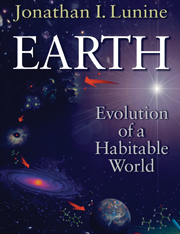Book contents
- Frontmatter
- Contents
- Preface
- Acknowledgments
- PART ONE THE ASTRONOMICAL PLANET: EARTH'S PLACE IN THE COSMOS
- PART TWO THE MEASURABLE PLANET: TOOLS TO DISCERN THE HISTORY OF EARTH AND THE PLANETS
- PART THREE THE HISTORICAL PLANET: EARTH AND SOLAR SYSTEM THROUGH TIME
- PART FOUR THE ONCE AND FUTURE PLANET
- Index
- Plate section
Preface
- Frontmatter
- Contents
- Preface
- Acknowledgments
- PART ONE THE ASTRONOMICAL PLANET: EARTH'S PLACE IN THE COSMOS
- PART TWO THE MEASURABLE PLANET: TOOLS TO DISCERN THE HISTORY OF EARTH AND THE PLANETS
- PART THREE THE HISTORICAL PLANET: EARTH AND SOLAR SYSTEM THROUGH TIME
- PART FOUR THE ONCE AND FUTURE PLANET
- Index
- Plate section
Summary
At the close of the second millennium A.D., we live in extraordinary times. A generation ago, human beings first ventured beyond Earth's atmosphere into the vast emptiness of space, began to unlock the remarkable secrets beneath the oceans of how Earth's geology works, and to crack in earnest the genetic code that determines the fundamental nature of all life. Today, these and other frontiers remain open to us, yet we also are consumed with a multitude of problems seemingly of our own making. Increasingly, too many people compete for too few resources and make fundamental changes to the life-giving air and oceans of our planet. Further, we find ourselves confused about science and technology: Are they the cause of, or the solution to, these daunting problems?
Regardless of which way one chooses to answer this question, of deepest concern is that science and technology are understood by few, even in the technologically advanced industrial nations. We use computers and cellular phones with ease, yet how many of us understand the basic principles by which they work? We look forward to the change of seasons and scan the weather reports for tomorrow's outlook on rain, yet remarkably few of us can explain the motions of Earth in the cosmos, and the underlying causes of the atmospheric changes we call weather and climate. We talk glibly about the promise and problems of genetic engineering, yet most such conversations are conducted in the absence of any familiarity with what the genetic code actually is and how it functions.
- Type
- Chapter
- Information
- EarthEvolution of a Habitable World, pp. xvii - xviiiPublisher: Cambridge University PressPrint publication year: 1998



